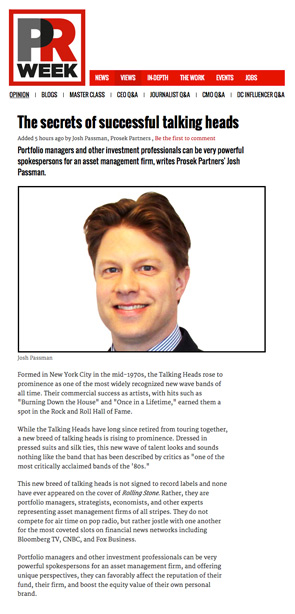
PRWeek
By Josh Passman
Portfolio managers and other investment professionals can be very powerful spokespersons for an asset management firm, writes Prosek Partners' Josh Passman.
Formed in New York City in the mid-1970s, the Talking Heads rose to prominence as one of the most widely recognized new wave bands of all time. Their commercial success as artists, with hits such as "Burning Down the House" and "Once in a Lifetime," earned them a spot in the Rock and Roll Hall of Fame.
While the Talking Heads have long since retired from touring together, a new breed of talking heads is rising to prominence. Dressed in pressed suits and silk ties, this new wave of talent looks and sounds nothing like the band that has been described by critics as "one of the most critically acclaimed bands of the '80s."
This new breed of talking heads is not signed to record labels and none have ever appeared on the cover of Rolling Stone. Rather, they are portfolio managers, strategists, economists, and other experts representing asset management firms of all stripes. They do not compete for air time on pop radio, but rather jostle with one another for the most coveted slots on financial news networks including Bloomberg TV, CNBC, and Fox Business.
Portfolio managers and other investment professionals can be very powerful spokespersons for an asset management firm, and offering unique perspectives, they can favorably affect the reputation of their fund, their firm, and boost the equity value of their own personal brand.
So, what separates the stars from the flops? Here are three observations worth noting for those investment professionals that have been designated as on-air spokespersons by their respective firms, as well as for those in functions such as marketing and distribution that benefit from on-air brand exposure:
1. Does anyone have any questions for my answers?
This is a quote made famous by Henry Kissinger, who once opened a press conference with this question. Kissinger knew what he wanted to say to the press and was going to get his points across regardless of the types of questions posed to him by reporters. Those fund managers that do the best job on CNBC and Bloomberg are those that, like Kissinger, know what they want to say before the camera starts rolling. They are prepared with memorable sound bites that will help differentiate them from other commentators and they use their time on-air judiciously to espouse their unique perspectives on investing and the markets. On the other hand, too many fund managers spend the precious few minutes they have on-air answering a set of unrelated questions that give them close to no chance to make a memorable impression. These managers would be wise to take a page from Kissinger.
2. Who are you?
Investors and their advisers will always be focused on investment performance. But, they are also keenly interested in who is managing their money. An on-air TV interview provides an invaluable opportunity to humanize the manager behind the fund and to showcase how the manager’s life experiences have influenced how he or she invests. During a three-minute TV segment, there is scant opportunity for a manager to outline in any great detail how he or she runs the portfolio. In fact, when speaking to a broad audience with varying levels of investment knowledge, it is probably best to avoid diving too deep into investment strategy. Rather, by sharing personal anecdotes and stories that bring to life the way the manager views the world, much can be done to showcase the people behind the portfolio and create a positive impression. A great example of this is a fund manager who described a recent family vacation to Spain. He discussed how he was turned on to a compelling investment idea by observing traffic patterns in Madrid and how he had implemented this investment thesis in his portfolio.
3. Can you hear me now?
While broadcast TV provides a compelling platform for asset managers to build and strengthen their brands, there is a big challenge to communicating over this type of medium. Whether on a Wall Street trading floor, in the office of a financial adviser, or in the waiting room at the dentist’s office, TVs airing financial news often have their sound muted. Assuming the spokesperson is prepared with his or her talking points and has a personal story to tell that will help viewers understand how he or she invests, how can one possibly overcome the challenge of conveying their views when the volume is turned off? The most compelling interviewees are those that visibly demonstrate passion and enthusiasm, and that use facial expressions and hand gestures to hammer home their points. These are the folks that make you want to turn up the volume to hear what they have to say.
Asset management firms are increasingly looking to differentiate themselves in a crowded and cluttered environment. Leveraging the expertise of investment professionals to increase brand awareness through broadcast interview appearances is one way to accomplish this goal. The firms that do it best are those that recognize that an interview is an opportunity to set the agenda, tell a story, and be memorable. The Talking Heads are memorable nearly 25 years since they broke up. The talking heads that too often go on-air without a game plan to maximize their opportunity will be lucky to be remembered 25 minutes after their segment ends.
